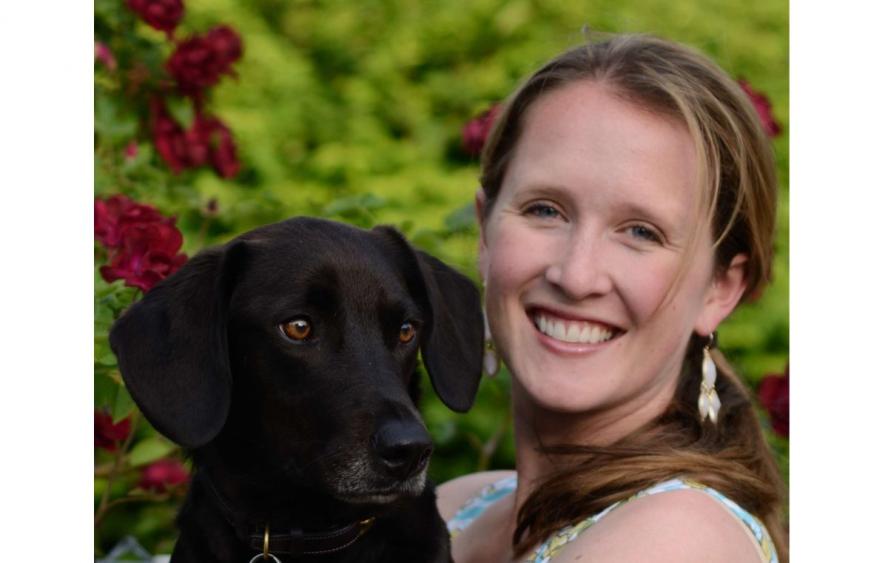-
About
- Leadership & Faculty
- News & Events
-
Academics
- Graduate
- Advanced Clinical Training
- Continuing Education
- Academic Departments
- Academic Offices
- Simulation Experiences
-
Student Life
- Offices
-
Research
-
Hospitals & Clinics
- Emergency Care
- Hospital Services
-
Community Outreach
- Volunteer
Making the World a Better Place for Humans and their Animal Companions
Dr. Megan Kiely Mueller

Developmental psychologist and Cummings School faculty member, Dr. Megan Kiely Mueller, always had a love of animals. She grew up with many pets, began riding horses at the age of five, and thought she would become a veterinarian. After some soul searching in high school, however, Dr. Mueller decided instead to pursue the study of the human mind. Earning a bachelor’s degree in child development and psychology, she went on to pursue master’s and Ph.D. degrees in child study and human development.
A research assistant professor at Cummings School, Dr. Mueller now strategically blends her educational background with her love of animals through the field of human-animal interaction (HAI). More specifically, she focuses on how the interactions between humans and animals promote health and well-being for all.
The power of human-animal relationships first grabbed her attention as a Ph.D. student. She credits her mentor, Dr. Richard Lerner, Director of the Institute for Applied Research in Youth Development at Tufts University, for encouraging her to take on this new and innovative area of research. Dr. Mueller has since dedicated her professional life to better understand how people think about and interact with animals, and how those interactions benefit human beings as well as the animals themselves.
Dr. Mueller continues to conduct research on how animal-assisted education, animal-assisted therapy, and animal-based community programs can promote healthy children, families, and communities.
“Combining Dr. Mueller’s background in child and adolescent development with her interest in human-animal interaction, she reaches new students, brings disciplines together, and creates new opportunities to conduct research on some of Cummings School’s most important veterinary and service outreach activities,” says Dr. Allen Rutberg, Director of the Center for Animals and Public Policy at Cummings School.
Dr. Mueller now conducts research on how animal-assisted education, animal-assisted therapy, and animal-based community programs can promote healthy children, families and communities. For one of her hallmark research projects, Dr. Mueller led a study on children in military families. These families move frequently, upending the children’s school and social relationships, and parents may be deployed for long periods, placing further stress on the families. The study found that, for kids with a currently deployed parent, having a strong bond with a pet was associated with having more adaptive coping skills.
At Cummings School, students in the Master of Science in Animals and Public Policy (MAPP) program are introduced to Dr. Mueller’s research interests and unique experiences during their first semester through two foundational courses—Human-Animal Interactions and Research Methods.
Exposing MAPP students to HAI opens many career paths. Service animal training and HAI research and teaching are growth fields, and with further training, students may incorporate animals into careers in occupational therapy, clinical psychology, and education. Whether it is providing guidance on a student’s research project or advice on opportunities for practical field experiences, Dr. Mueller enthusiastically involves students in her research initiatives. “Dr. Mueller’s Human-Animal Interaction course sparked a newfound interest for me in the field of animal-assisted therapy. During my Tufts Paws for People externship, she gave me the resources to transition smoothly into my final research project. Her enthusiasm, encouragement, and positive outlook led to my completion of a study exploring animal-assisted activities on college campuses across the United States,” says Julie Haggerty, MAPP’16.
Actively engaged in the Tufts Paws for People program with her dog Jett, Dr. Mueller often brings her MAPP students along on animal visitation programs, allowing the students to witness firsthand the shared benefits of human-animal interaction.
While the benefits of animal relationships are readily apparent for humans, Dr. Mueller does not minimize the potential impact to the animals themselves. According to Dr. Mueller, “it’s important that we are fostering relationships that make the world a better place for animals as well as people.”
Department:
M.S. in Animals and Public Policy